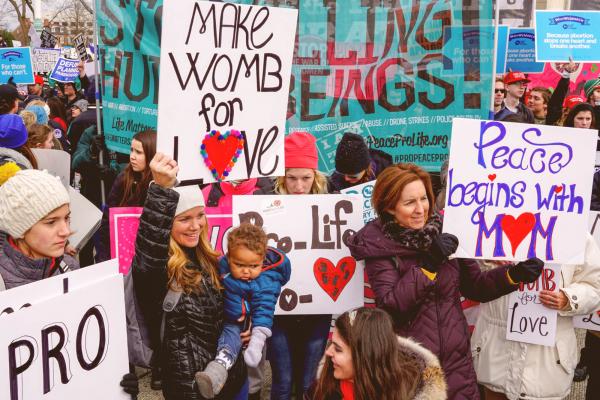As the Women’s March on Washington drew more than a million protesters to the nation’s capital, defensive comments and memes proliferated on conservative social media. Many pitted women who attended the march against those who would support the March for Life the next weekend. “Will you also march for the unborn?” the line asked.
The answer is yes. Many did. I went to the March for Life, mostly out of curiosity and a conviction to break out of my liberal bubble and some of my preconceived notions about pro-lifers.
Instead, I was faced with a very bleak question: To be pro-life, do you have to support Donald Trump?
This year’s March for Life showed me that to be pro-life under the Trump administration, you must adhere to the beliefs of conservative leaders like Mike Pence, Kellyanne Conway, and Eric Metaxas; that you must disapprove of and demand the defunding of Planned Parenthood; and that Roe v. Wade is the most disgusting offense to our society.
When did this single-minded and opportunistic rhetoric start? At one point in our history, some conservatives were openly in favor of using birth control as a method of eugenics, and some progressive Catholics fought to outlaw abortion and for the state to support poor women and families. Now, our famed political divisiveness is such that pro-life Democrats and pro-choice Republicans have all but gone extinct. Last week, Donald Trump gave all those marching to overturn Roe v. Wade his “full support.” At the March for Life, it was clear that many believe Trump is a “pro-life president” — despite his many past comments to the contrary — because he has promised to appoint someone to overturn federal legalized abortion. In some ways, to celebrate the end of legal abortion in 2017 is to celebrate the election of Donald Trump.
But the stark divides between our elected officials do not reflect the majority when it comes to abortion. While headlines report a nearly even split between Americans who claim the labels of “pro-life” (44 percent) and “pro-choice” (50 percent), actual beliefs are more complex: A full 49 percent say abortion should be legal in at least some cases.
As a progressive woman of faith who has occupied conservative spaces almost all my life, I am used to hearing a more nuanced, “consistent life” argument about abortion. “Pro-birth” isn’t the same thing as “pro-life.” If you are going to care about abortion as a matter of defending life, you must also fight for better access to child health care and adoption. If you are going to speak for the value of family, you must also speak for immigrants’ rights. If you are going to protect the most vulnerable, consider those who have already been born.
Yet unlike many pro-life-sympathetic progressives, I find I cannot just “skip over” abortion to the other issues.
I believe in working toward the end of abortion by preventing the need for abortion — with access to affordable contraception, eliminating sexual violence against women, and offering affordable health care to new moms and young children. I believe abortion is a symptom of a patriarchal and capitalist system, one that ultimately causes harm by forcing women into situations where abortion is the preferable option. Pope Francis is right when he states in Laudato Si that our “throwaway culture” has allowed us to explain away the disposal of life, evidenced by environmental destruction, ableism, neglect of the elderly, and abortion. Ending abortion also looks like a society where women do not fear that their career will be threatened due to pregnancy and motherhood, where an economy can accommodate the needs of young parents, and where misogyny won’t assume that a woman has to do it all to have it all.
I also take seriously that Pope Francis mentions abortion only once in his 200-part encyclical, implying to the faithful that single-issue advocacy may not be the end game. Reading the sign of the times calls anti-abortion believers to faithfully address a broad range of social issues — and to extend a hand of understanding toward those who have had an abortion, an effort personally championed by the pope.
My middle-ground beliefs on abortion were definitely challenged when The Atlantic told the story of a progressive pro-life group that was removed from the list of Women’s March on Washington sponsors. The group, New Wave Feminists, was first added to the website in the interest of intersectionality — to, as Women’s March co-chair Bob Bland stated, “not just talk about feminism as one issue, like access to reproductive care.” When the group was removed a few days later, I was forced to consider that progressive women were saying, “You cannot be a feminist and pro-life at the same time.”
How then shall you live?
I’ve come to believe that fighting for the sanctity of life with the pro-life movement as it is now — propped up by a Trump administration — may simply not be worth it. Not in these times. Even though my personal conviction about abortion may not fully align, I will continue to navigate the pro-choice political space. I would rather stand with people who wish to end the use of violence against women, to increase LGBTQIA rights, to fight for a living wage, to make black lives matter, to welcome immigrants and refugees, and to care for climate justice than reclaim the word “pro-life” for myself.
Got something to say about what you're reading? We value your feedback!

